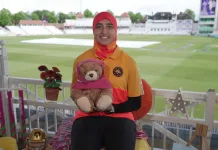The BBC has defended its decision to use the N-word for the second time after receiving hundreds of complaints.
The broadcaster was slammed after presenter Lucy Worsley used the racial slur in BBC Two’s American History’s Biggest Fibs on 1st August, while discussing the freedom of slaves.
During the show, Lucy covered the reaction to a speech by President Abraham Lincoln, who in 1865 declared at the White House that Black people should be given the right to vote.
John Wilkes Booth, who went on to kill the president days later, was enraged by the declaration and spoke about his plans to quiet Lincoln permanently.
In a piece-to-camera, Lucy told the audience: ‘He said, and his words carry a health warning, “that means n****r citizenship. By God, that’s the last speech he will ever make”.’
A BBC spokesperson warned its viewers of the nature of the programme at the time.
They said: ‘This is a history programme about the American Civil War and features contributions from a number of African American scholars.
‘Content information about the nature of the film was given before the programme started, and presenter Lucy Worsley gave a clear warning to the audience before quoting John Wilkes Booth as the term clearly has the potential to cause offence.’
After the programme aired, it has received ‘more than 100’ complaints, leading the BBC to step in and defend its decision to use the racial slur.
‘Firstly we understand and we are sorry for any distress caused to any of our audience by language included in the programme,’ the broadcaster said in a statement.
‘We recognise it is an offensive term and one that is rarely included in our output. We assess all content we broadcast on a case by case basis taking into consideration a range of factors including the programme and the context.
‘This film was the second episode of a history series originally shown on BBC FOUR last year and it explored the American Civil War, featuring contributions from a number of African American scholars. This episode included a John Wilkes Booth quote uttered in reaction to President Abraham Lincoln’s 1865 speech in which Lincoln declared that people, regardless of colour, should have equal rights to vote. ‘
The statement went on to add that viewers were warned at the beginning of the programme as to the ‘nature of the content’.
It continued: ‘The language used in Wilkes Booth’s statement was included to indicate the strength of his views and his attitude towards African Americans – racist views shared by many at that period in America’s history. A continuity announcement at the start of the programme flagged to viewers the nature of the content; this was reinforced by the presenter who alerted the audience before reading from the Wilkes Booth statement.
‘We have listened to audience concerns and have re-edited the programme on BBC iPlayer. If we were making this programme today we would not have included the word.’
It comes after the BBC presenter issued an apology for using the racial slur.
After one Twitter follower called her out, Lucy admitted: ‘You’re right, @therealpetraamp, it wasn’t acceptable and I apologise.’
It’s also the second time that the BBC has come under fire for a presenter saying the N-word.
A BBC News segment featured presenter Fiona Lamdin discussing a racially motivated attack on a black man.
Following both incidents, BBC Director-General Tony Hall also released a statement.
‘This morning I brought together a group of BBC colleagues to discuss our news coverage of the recent shocking attack on an NHS worker. I wanted us to look at the issues raised by the reporting and the strength of feeling surrounding it,’ he began.
‘We are proud of the BBC’s values of inclusion and respect, and have reflected long and hard on what people have had to say about the use of the n-word and all racist language both inside and outside the organisation.
‘It should be clear that the BBC’s intention was to highlight an alleged racist attack. This is important journalism which the BBC should be reporting on and we will continue to do so.
‘Yet despite these good intentions, I recognise that we have ended up creating distress amongst many people.’
‘The BBC now accepts that we should have taken a different approach at the time of broadcast and we are very sorry for that. We will now be strengthening our guidance on offensive language across our output,’ he apologised.
‘Every organisation should be able to acknowledge when it has made a mistake. We made one here. It is important for us to listen – and also to learn. And that is what we will continue to do.’















